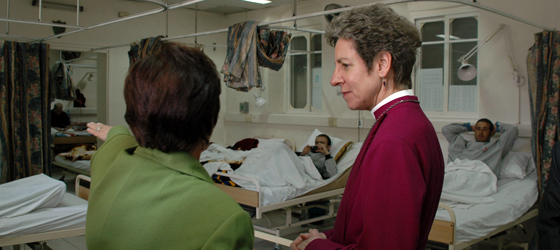UNRWA extends funding for six months to Gaza’s Ahli Arab HospitalPosted Jul 26, 2012 |
|

Presiding Bishop Katharine Jefferts Schori learns about the ministry of Ahli Arab Hospital from its director Suhaila Tarazi. Jefferts Schori visited Gaza and the hospital in March 2008. ENS photo/Matthew Davies
[Episcopal News Service] The United Nations Relief and Works Agency (UNRWA) has offered to extend funding support for the Ahli Arab Hospital in Gaza for six months, allowing the hospital to honor its financial obligations and retain its staff until the end of 2012.
On June 1, UNRWA announced it would no longer fund the hospital, which provides primary and emergency health care to the almost exclusively Muslim population in Gaza. The decision cut the hospital’s budget by approximately $1 million per year, or nearly half.
Bishop Suheil Dawani said in a press release that the Episcopal Diocese of Jerusalem, which runs the hospital, is “absolutely committed” to keeping the institution open, “as it is the only Christian hospital in the Gaza Strip, … [but] we know that we need to move quickly to help the hospital transition to a different model, so that it is not financially dependent on UNRWA from 2013 and so that donors can have confidence to continue to invest in equipment and programs.”
Dawani said that the diocese has engaged a consultancy firm to assist with the development of a new strategic plan for the hospital’s future.
Presiding Bishop Katharine Jefferts Schori welcomed the news about UNRWA’s bridging contract. While it doesn’t solve the longer-term problem of funding, she said, it does at least offer some space.
“The Episcopal Church is most grateful for UNRWA’s decision to provide six months of transitional support to Al Ahli Hospital,” Jefferts Schori told ENS July 26. “This offers the Diocese of Jerusalem a slim window in which to develop funding for 2013 and beyond. It will be challenging work, but I have abundant hope that partners from around the world will rally to support this essential and transformative ministry of healing.”
UNRWA, which functions as a relief agency for Palestinian refugees, earlier this year decided to run a transparent application process for its funding of in-patient services in Gaza. The Ahli Arab Hospital, one of Gaza’s 21 primary health centers, did not win the contract. UNRWA’s decision came after nearly two decades of partnership with the hospital.
The 77th General Convention earlier this month, in passing Resolution B017, called on the Episcopal Church to support Ahli Arab Hospital through fundraising and advocacy. In Resolution B019, General Convention also affirmed positive investment “as a necessary means to create a sound economy and a sustainable infrastructure” in the Palestinian Territories.
In early June, Jefferts Schori along with 101 Episcopal Church bishops wrote to President Barack Obama calling for his intervention in reversing the funding decision that, they said, could have “disastrous consequences for the more than two million residents of Gaza, already living in conditions of profound humanitarian need.”
According to the UNRWA website, 1,167,572 of Gaza’s residents are registered refugees and the Gaza Strip, which is 25 miles long and between 3.7 and 7.5 miles wide, includes eight refugee camps. Of the more than 2 million total residents, fewer than 1,500 are Christian.
The Ahli Arab Hospital was founded as a mission of the Anglican Church in 1882 and became a part of the diocese in 1982. Today, it is among more than 30 institutions run by the Jerusalem-based diocese throughout Lebanon, Syria, Jordan, Israel and the Palestinian Territories.
Suhaila Tarazi, hospital director, said in a July 26 press release, “We are proud of our long and valued relationship with UNRWA. We invite all our partners around the world to help us stay open and be ready to serve the poor in Gaza, regardless of race or religion.”
The American Friends of the Episcopal Diocese of Jerusalem recently sent $50,000 to the hospital as part of its ongoing mission to support the institutions of the diocese.
Acknowledging that the humanitarian tragedy in Gaza “is well known and ongoing,” Anne Lynn, executive director of AFEDJ, told ENS that Ahli Arab Hospital “is the face of Christianity for these beleaguered people. So it’s no surprise that the Diocese of Jerusalem is committed to stay the course and keep the doors open.”
Lynn said that AFEDJ and its donors are committed to help. “The diocese is taking smart, long-range steps to sustain the hospital. But they can’t make this transition without a lot of support,” she said. “We’ll be working hard find that support so the skilled staff at Ahli can continue to provide compassionate care to all.”
— Matthew Davies is an editor/reporter for the Episcopal News Service.

Social Menu